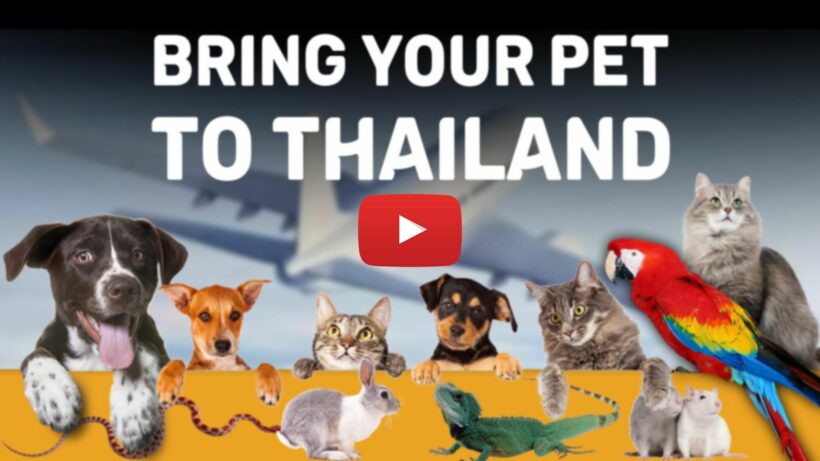Can you bring your pets to Thailand? Here’s all you need to know

Want to bring your pets with you to Thailand but don’t know where to start? Don’t worry; we have you covered! As an animal lover, it’s only natural that you want your lovely furry friends to be with you everywhere you go. Luckily, Thailand allows most pets to come along with you in your big move. There are, however, certain requirements that you need to meet. Here’s everything you need to know about bringing your pet into Thailand.
What kind of pet or animal can I bring to Thailand?
Thailand allows most domestic pets to be imported into the country. But unfortunately, some pets are prohibited. Pit Bull Terriers and American Staffordshire terriers, for example, are prohibited.
The majority of dogs, cats, and rabbits have the same requirements. However, birds, rodents, tropical fish, amphibia, and reptiles may need to meet different requirements and have a health certificate to enter Thailand. This means that if you have a unique pet, such as a parrot or a turtle, you need to verify that it’s not protected under the Convention on International Trade in Endangered Species of Wild Fauna and Flora (CITES). If your pet is protected under the CITES, you have to apply for additional permits.
If you need help with the procedures and regulations, it’s best to contact an experienced pet relocation specialist. They will help you have a smooth and stress-free pet relocation experience.
What are the requirements to move pets to Thailand?

No matter where you’re from, a rabies titer test (FAVN) is not necessary for pets entering Thailand. However, to make sure that your pet can be easily identified, it must be microchipped. Make sure the microchips meet ISO Standard 11784 or ISO Standard 11785. Thailand also currently accepts AVID 9 and AVID 10 chips.
After the microchip has been implanted, your pet needs to receive an inactivated rabies vaccine. You have to show the official rabies certificate when you arrive in Thailand. The certificate must include the microchip number, the date of inoculation, and the duration of the vaccine.
Canine distemper, parvovirus, leptospirosis, and hepatitis (DHLPP) vaccinations are also required for dogs. On the other hand, cats need to be vaccinated against chlamydia, feline parvovirus, and cat flu.
All required vaccinations for your pet must have been given at least 21 days prior to your arrival in Thailand but no more than a year.
Vaccination for puppies and kittens

Puppies and kittens must be at least three months old to be vaccinated, and they must wait 30 days following their immunisations before they are allowed entry. The minimum age for import is, therefore, four months old. You need to have a completed vet health certificate (form 7001) from a recognised veterinarian within ten days of the date your pet is scheduled to fly.
You also have to obtain an import permit from the Bangkok Animal Quarantine Station. This permit is valid for 45 days from its date of issue.
What’s the moving process like?

Your pets will need to be inspected 48 hours before their export license is granted. The export license and health certificate should be issued after the inspection, and a copy will be sent to you, the owner, before departure.
If your pet doesn’t meet certain requirements, it may need to be put in a 3-day quarantine upon arrival in Thailand. You can only bring your pet home if the results of all inspections and tests are satisfactory.
Depending on the airline and the size of your pet, pets can fly to Suvarnabhumi International Airport in Bangkok and travel in the cabin, as checked luggage, or as air cargo. Keep in mind that you shouldn’t expose your pet to other animals while they’re traveling to another country. Therefore, they will only be allowed to stay in an officially approved quarantine area during any transit.
Where can I find pet movers in Thailand?

There are several businesses that provide relocation services, and the majority of them also handle documentation processing. Some are also managing the entire procedure, which includes booking flights, getting veterinary care, and delivering pets.
The International Pet and Animal Transportation Association are one of the most well-known providers of pet relocation services. Since this is a non-profit organisation with a number of businesses represented as members, it is best to get in touch with them before deciding on the pet service of your choice so that you can feel confident about transferring your pet. They can give you a list of reliable pet shippers so you can prevent fraud and cons.
You can get in touch with the following authorities to inquire about pet relocation in Thailand. The organisation in charge of pet relocating:
Bureau of Disease Control and Veterinary Services, Department of Livestock Development
Address: Phayathai Road, Ratchtavee, 10400 Bangkok, Thailand
Phone: 66-2-653-4550 ext. 4175
Fax: 66-2-653-4929
Email: quarantine_dcontrol@dld.go.th
The process can be long and complex, but if you’re like us, there’s nothing we wouldn’t do for our furry friends, right?!
Moving with a pet to Thailand means you need to live somewhere pet-friendly. Check out these pet-friendly condos in Bangkok and have a happy life with your furry friends!
Latest Thailand News
Follow The Thaiger on Google News:



























